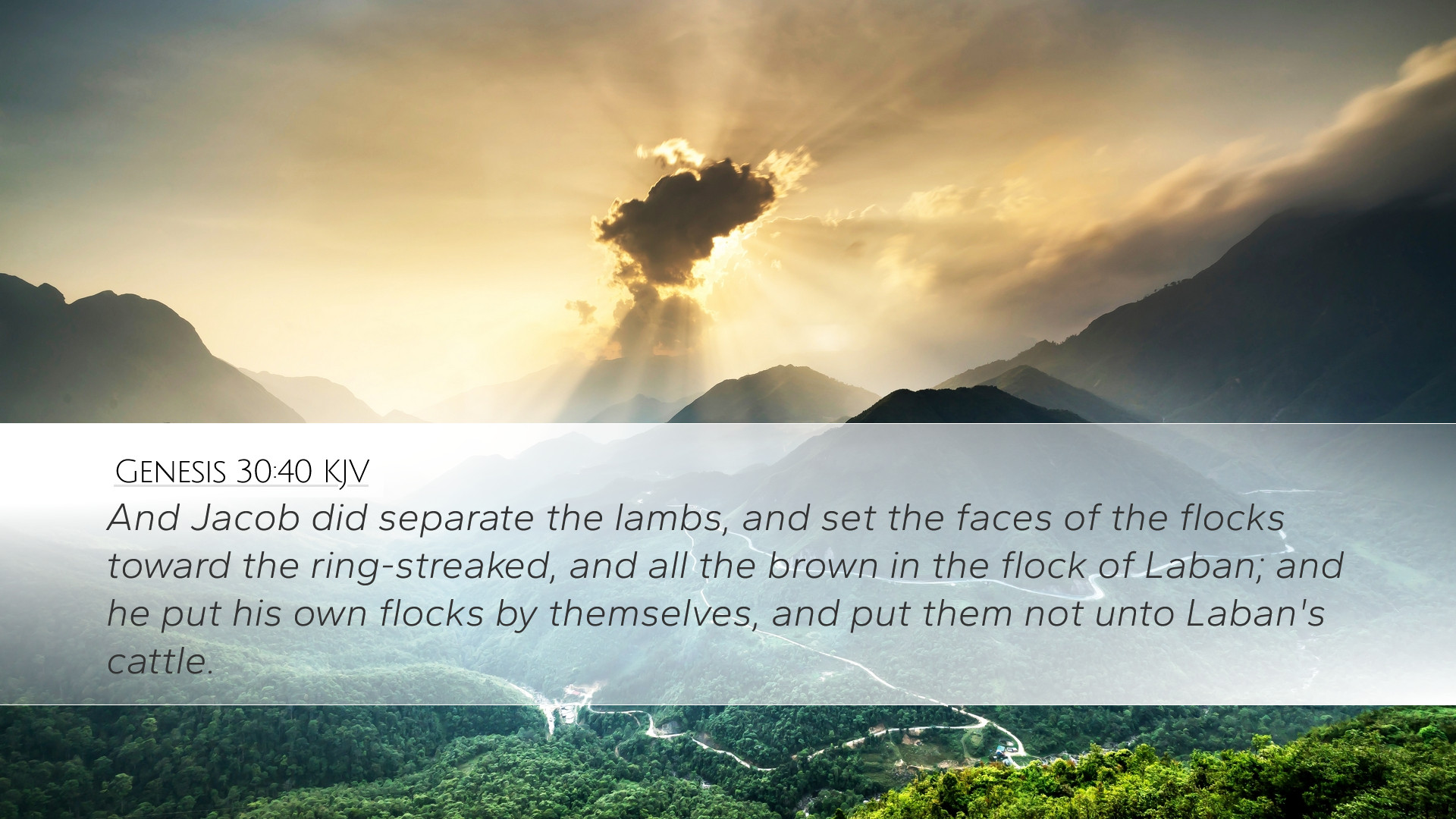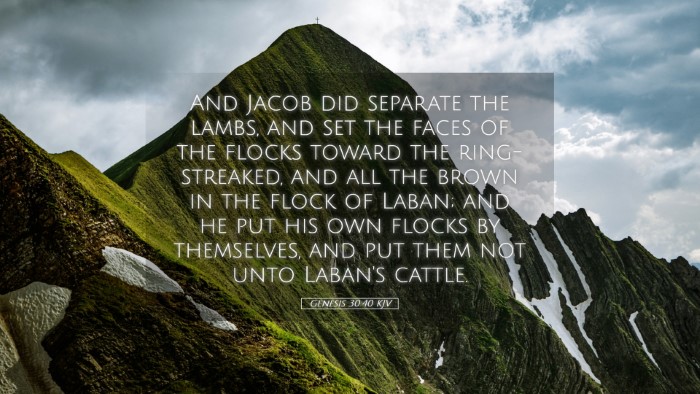Commentary on Genesis 30:40
Bible Verse: Genesis 30:40 - "And Jacob did separate the lambs, and set the faces of the flocks toward the ringstraked, and all the brown in the flock of Laban; and he put his own flocks by themselves, and put them not unto Laban's cattle."
Context of Genesis 30:40
This verse is situated within the narrative of Jacob's complex relationship with Laban, his uncle, and employer. Jacob is in a situation where he desires to secure wealth and sustenance for his family, and he employs a strategy involving selective breeding as a means of obtaining livestock that will benefit him while working for Laban.
Commentary Insights
Matthew Henry's Concise Commentary
Matthew Henry emphasizes the cunning of Jacob in this endeavor. He notes that Jacob, learning about the natural characteristics of the livestock, implements a system of selective breeding under divine providence. The practice of separating the lambs and setting the flocks towards certain patterns is seen as Jacob’s way of taking advantage of the natural outcomes while trusting in God’s blessings.
Henry points out that Jacob's actions are illustrative of hard work and ingenuity blessed by divine favor: “He did not wait for a mere miracle, but he used all available means to provide for his family.” He further remarks on how this reflects God's providence in leading Jacob toward success despite the deceptive practices of Laban.
Albert Barnes' Notes on the Bible
Barnes provides a detailed analysis of Jacob’s strategic practices. He argues that the procedure Jacob employed, separating his flocks and arranging breeding conditions, demonstrates a significant understanding of animal husbandry. Barnes indicates that Jacob's actions serve as an example of wise stewardship over the resources given to him and reflects his faith that God would bless his efforts.
Moreover, Barnes discusses the importance of Jacob placing his flocks apart from Laban's cattle, noting the necessity of clear distinctions when it comes to stewardship and possession. This act of separation hints at the deeper spiritual truth that God’s people must strive for righteousness and separation from influences that may corrupt their integrity.
Adam Clarke's Commentary
Adam Clarke delves into the specific breeding techniques mentioned in this verse, noting the relevance of the ringstraked and brown markings. He elaborates on the practices of the time concerning breeding and how Jacob’s innovative methods were progressive for his era. Clarke explains that Jacob understood the principle of visual cues in breeding: “What is seen can be transferred to progeny; thus, Jacob utilized this notion to increase his wealth.”
Clarke also examines the moral implications of Jacob's actions, highlighting that although Jacob was shrewd, he remained under the guidance of God. He suggests that this passage underscores the necessity of divine oversight in all human endeavors and that, even when we strategize, submission to God’s will is paramount for true success.
Theological Reflections
This scripture invites several theological reflections that can enhance pastoral teaching and personal study:
- The Role of Divine Providence: Jacob’s success was not merely by his cleverness but by God’s providence working through his efforts. This serves as a reminder that all success stems from God’s blessing.
- Faith in Action: Jacob exemplifies how faith should manifest in practical ways. He does not passively wait for blessings, suggesting that believers are called to act faithfully within their circumstances.
- Integrity in Stewardship: The separation of flocks signifies the importance of maintaining boundaries and integrity in the face of adverse relationships, urging those in leadership or mentorship roles to protect their authority with wisdom.
Practical Applications
The insights drawn from Genesis 30:40 extend beyond its historical context, offering lessons relevant to contemporary believers:
- Strategic Planning: Like Jacob, modern believers may find that planning and strategy, paired with faith, can lead to fruitful outcomes. Wisdom and foresight in decision-making are crucial.
- Managing Relationships: The narrative highlights the complexity of relationships. Congregational leaders may draw from Jacob's experience to navigate tricky dynamics with integrity.
- Trust in God: Jacob's reliance on God for his increased wealth demonstrates that while human effort is critical, ultimate trust must be placed in God's provision and timing.
Conclusion
In conclusion, Genesis 30:40 information supplements a rich tapestry of biblical themes concerning providence, integrity, and moral strategy. The commentaries from notable scholars underscore the need for wise and thoughtful engagement with life's challenges through faith and diligence. For pastors, students, theologians, and scholars alike, this verse encapsulates essential principles for personal and communal growth while serving as a reminder of God’s sovereign guidance in every endeavor.


